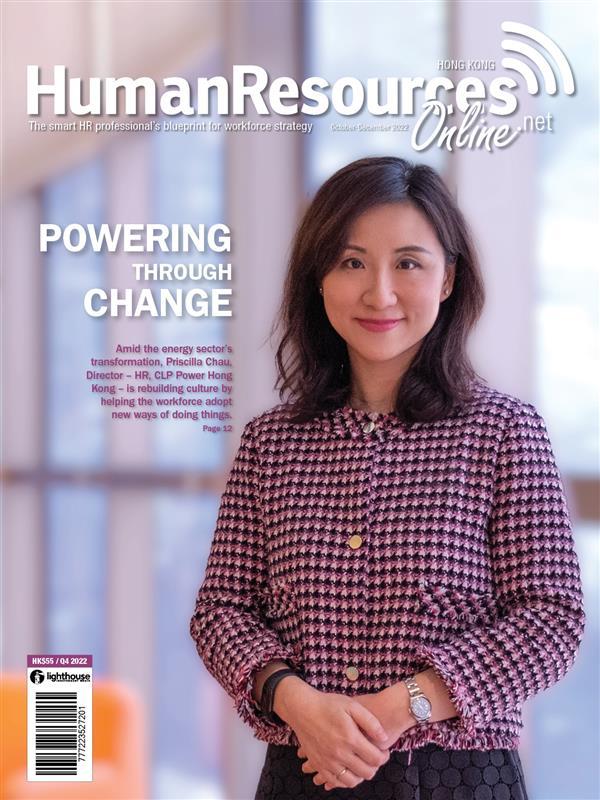Follow us on Telegram and on Instagram @humanresourcesonline for all the latest HR and manpower news from around the region!
share on
Amid the energy sector’s transformation, Priscilla Chau, Director – HR, CLP Power Hong Kong, is rebuilding culture by helping the workforce adopt new ways of doing things.
Vital stats: Priscilla Chau is a senior HR leader with over 20 years of experience in a variety of Asia Pacific HR roles, including business partnering, talent development, and HR process improvement. Having taken on her current role in 2021, she leads the operations of people-related programmes to support the growth of CLP’s Hong Kong subsidiary, as well as plays a critical role in the continuous development of the HR function. Before CLP, she most recently spent 15 years with multinational industrial leader BASF in a variety of regional roles based at its Asia Pacific headquarters in Hong Kong.
Introduction: As the major power utility provider in Hong Kong, serving more than 80% of the population, CLP Power Hong Kong (CLP) is currently transforming to become the ‘Utility of the Future’ to stay ahead of the challenges brought by climate change, and rapidly evolving technologies.
The HR team, led by our interviewee Priscilla Chau, works on manpower planning to support this strategy.
The Hong Kong Power business is supported by over 50 colleagues in the HR function, covering more than 4,000 full-time and part-time employees. Overall, the CLP Group had more than 8,000 full-time and part-time employees as of 30 June 2022, of which about 5,400 staff were engaged in CLP’s businesses in Hong Kong and Mainland China, and 2,700 in the businesses in Australia, India, Southeast Asia, and Taiwan.
The leadership at CLP aims to instil a workplace culture that encourages creativity, experimentation, and taking responsibility.
“With changing customer needs and business environment, we would like to cultivate a group of employees who are adaptive to the changes and challenges with a creative and flexible mindset,” Chau tells us.
To this mission, CLP has had its ‘Design Thinking Programme’ in place since 2019 to equip employees with the ability and tools to innovate better ways of working. More than 4,000 employees have been trained and over 100 projects have been initiated by employees.
“We are excited to see our employees being empowered to drive transformation that varies from small processes to big ideas, which all contribute to the success of CLP,” Chau shares.
CLP is also striving to increase the involvement of employees in shaping the company culture; as such ‘Cultural Jam’ has been organised, a three-day group-wide forum for all employees to express their opinions and ideas on what an ideal company should look like.
In this interview, Aditi Sharma Kalra speaks to Chau to find out about the plans for workforce transformation, challenges faced in this sector, milestones achieved in business partnering, and more.
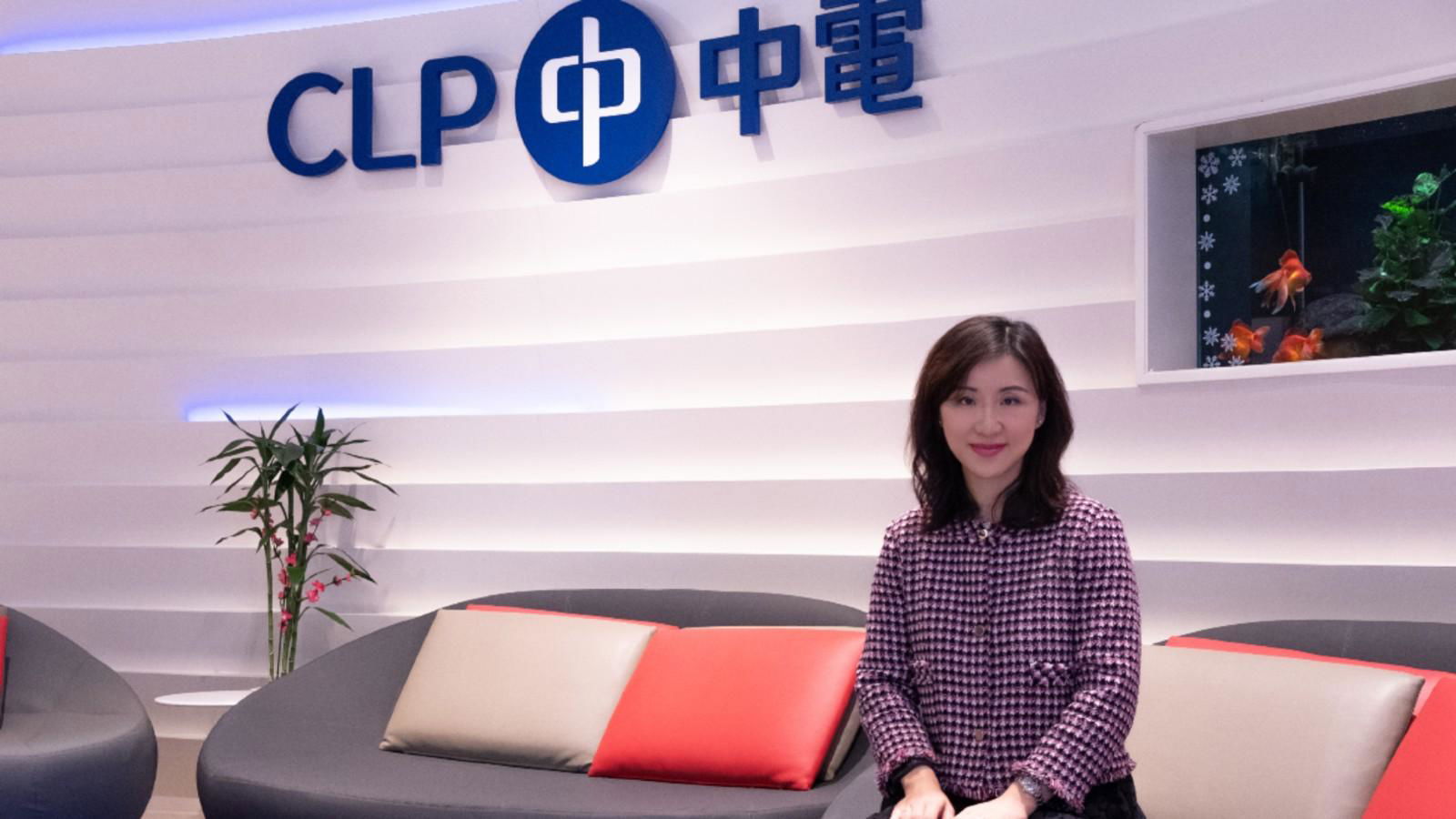
Q: What are the talent challenges you face as part of this role and sector?
Firstly, the power industry is traditionally male dominated, and a major change in the female ratio is a long-term challenge given the relatively limited supply of women with technical and engineering skills. As such, CLP has set gender diversity as a group-wide priority to ensure a diverse workforce.
We have set up a dedicated task force for a holistic review of gender diversity, where one of its major tasks is to formulate strategies to attract, recruit, and retain female staff.
We believe that a diverse workforce and an inclusive culture is important to our sustainable growth and innovation capability. New ideas and perspectives are needed to transform our business into a ‘Utility of the Future’. Energy transition, digital evolution, and increasing social and political uncertainties, as well as expectations in CLP’s markets, are driving the need for greater organisational agility – the ability to adapt and succeed in a rapidly changing environment.
CLP continues to strengthen efforts to resource for energy transition and growth, and attracting and retaining talent to support our business needs, in addition to enhancing the technical and digital capabilities of the workforce, amid accelerating changes in the industry.
Upskilling and empowering employees to respond rapidly to changing customer needs and drive breakthrough improvements, providing physical and virtual work environments that facilitate collaboration, and equipping employees to leverage new technologies, remain as our priorities.
CLP is also striving to instil a workplace culture that encourages creativity, experimentation, and taking responsibility. As the energy transition unfolds, CLP is committed to supporting its people to thrive in change, and promoting wellbeing and resilience.
Q: CLP has been consistently rated as among Hong Kong’s most coveted employers. Could you share the most impactful HR campaigns you and your team have implemented?
As a brand with over 120 years of history, CLP has maintained its reputation as a desirable employer in HK under an ever-changing employment environment, proving that we are heading in the right direction and should continue embracing a flexible mindset.
We believe that good employer branding comes from effective strategies such as our health and wellbeing programmes, work-life balance initiatives, and our enhanced family-friendly policies, with an emphasis on mental health and our recent introduction of more flexible working modes.
CLP has positioned its employee health and wellbeing strategy as ‘Boost’. This strategy aims to help employees in four key areas: physical health, mental wellness, social health, and financial wellbeing.
Under the ‘Boost’ wellbeing programme, we have introduced Virgin Pulse, a health and wellbeing digital platform and app, that provides a personal wellbeing journey – for example, more exercise, less stress, better eating, and healthy competition among our employees via team and company-wide challenges that make wellbeing fun.
We have appointed ‘Boost Wellness Champions’, a group of colleagues who are passionate about supporting fellow CLP colleagues to develop healthy habits and thrive at work and in their personal lives. A recent example of their work includes healthy recipes via internal videos.
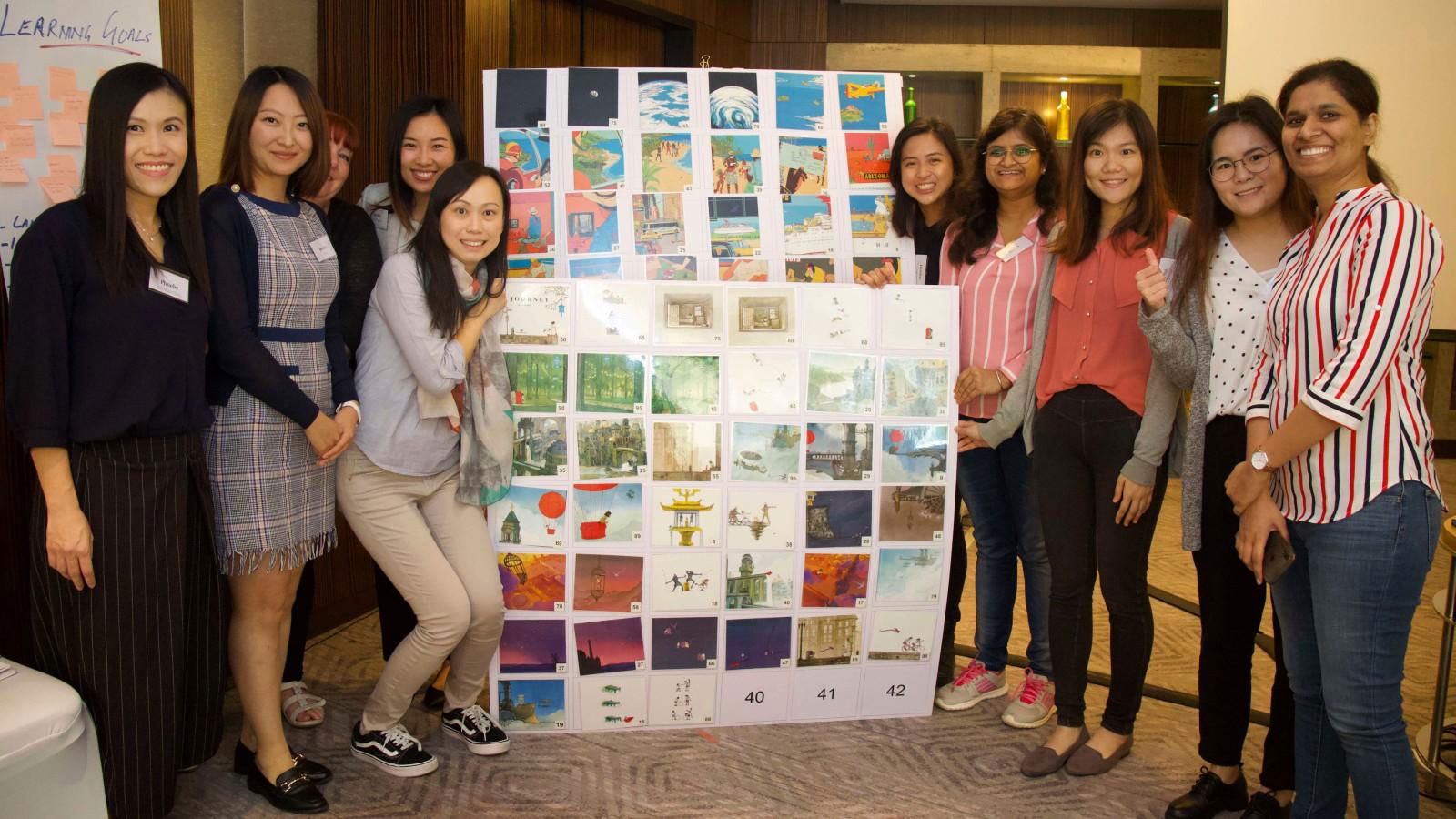
Beyond the work-life, we encourage employees to plan for a joyful retirement through pre-retirement workshops on mental and financial preparation, as well as our ‘CLP Retiree Recreation Club’ where retirees are welcome to continue to participate in CLP’s social, recreation, and sports activities, as well as volunteering services.
Under mental health support, our ‘Employee Assistance Programme’ has been made available since the early 1990s to assist individuals, and their immediate family members, who may encounter work or personal issues and need professional support. Services are provided by registered social workers and clinical psychologists and kept in strict confidence. Alongside, we provide access to mindfulness webinars, meditation workshops, and more.
In this space, we have further enhanced the people management capability of our people leaders, for which a series of mental health training courses were organised such as mental health first aid training. More than 250 mid-level managers in Hong Kong participated in the programme, equipping themselves with the knowledge to identify and address early signs of mental health issues.
Since then, a road map has been developed to embed psychological health in CLP’s policies and systems, and to plan for the objective of attaining the ISO 45003 certification for psychological health and safety at work from the International Organization for Standardization.
The mental health support ties into our work-life balance initiatives, wherein CLP’s social, recreation, and sports programme, offers activities, including Thai boxing, dance, yoga, tai chi classes, ball games, and the opportunity to sign up for corporate sports teams.
During the pandemic, more virtual fitness programmes were organised by adopting different technology such as Teams, Facebook, MS Stream, etc, allowing staff members to stay engaged and maintain their physical wellness. To increase awareness about the importance of good health and a healthy work-life balance, CLP Power has made October its ‘Work-Life Balance Month’, with a calendar of events, activities, and workshops, on subjects such as vegetarianism and diabetes.
Talking about our family-friendly policies, we have introduced flexible working hours; a work-from-home policy launched in 2022; an enhanced part-time working policy that provides more part-time pattern options; as well as an unpaid leave policy with a flexibility of up to three months.
All of the leave we provide is more than what the law requires – for example, five days of marriage leave, 16 weeks of maternity leave, 10 days of paternity leave as well as adoption leave, three days of compassionate leave, and one day of wellbeing leave (newly introduced in 2022).
Q: Talent management and business partnering have been the focus areas since you joined the organisation. What are CLP’s unique initiatives in this space, and what milestones have been achieved in this journey?
The labour market in Hong Kong is currently tight, and it imposes great pressure on companies to attract the right talent. From the HR perspective, it is important to promote CLP as an employer brand, and build an early pipeline to support the future needs of the company.
To attract more young talent to join the industry, we have different types of internship programmes to provide hands-on work experience through well-designed projects in a wide range of scopes. We have teamed up with universities and the Vocational Training Council to offer different types of scholarships. In addition, we have different graduate programmes such as the ‘Graduate Trainee’ and ‘Technical Trainee’ for graduates.
Strategic, general management, and talent development programmes are used to develop future leaders, with programmes delivered internally (in Hong Kong through the CLP Learning Institute) and in partnership with leading academic institutions (in Hong Kong through CLP Power Academy).
In addition, CLP monitors pay carefully to ensure it is competitive and rewards employees for individual and company performance. Core employee benefits are reviewed regularly to ensure they are fit-for-purpose and sustainable.
Q: Earlier last year, CLP Power was acknowledged as among the most inclusive employers in APAC. What affirmative action are you taking to ensure inclusion and diversity thrive to create an environment of belongingness?
At CLP, our ‘Value Framework’ has guiding principles to ensure we respect diversity, and we trust and treat our employees fairly, regardless of gender, race or other attributes. Moreover, we respect all internationally recognised human rights relevant to our operations, and require our business partners and suppliers to do the same.
CLP is also committed to providing safe, healthy, and secure work environments, free of discrimination or harassment on the basis of gender, physical or mental state, race, nationality, religion, age, family status or sexual orientation; or any other attribute recognised by the laws of the country in which we operate.
Among the affirmative action being taken at CLP, we started out with comprehensive and well-communicated policies and guidelines to foster a diverse and inclusive workplace. These cover equal opportunity policies on recruitment, promotion, etc.
We do have a multinational workforce made up of talent of different races and from different disciplines, age, race, academic backgrounds, and qualifications. We also enforce a harassment-free workplace policy.
In addition, we have well-established targets and initiatives to encourage more women to join the workforce through our ‘Women In Leadership’ and ‘Woman In Engineering’ initiatives, both of which have seen female percentages on an upward trend.
To not only attract, but also retain women talent, we provide a working environment and HR policies to take care of their needs, such as the aforementioned family-friendly policies, as well as networking support for female engineers.
Earlier in the pipeline, we have initiatives to inspire the younger generation’s interest in engineering, especially young female students so that they will consider engineering as a future career option.
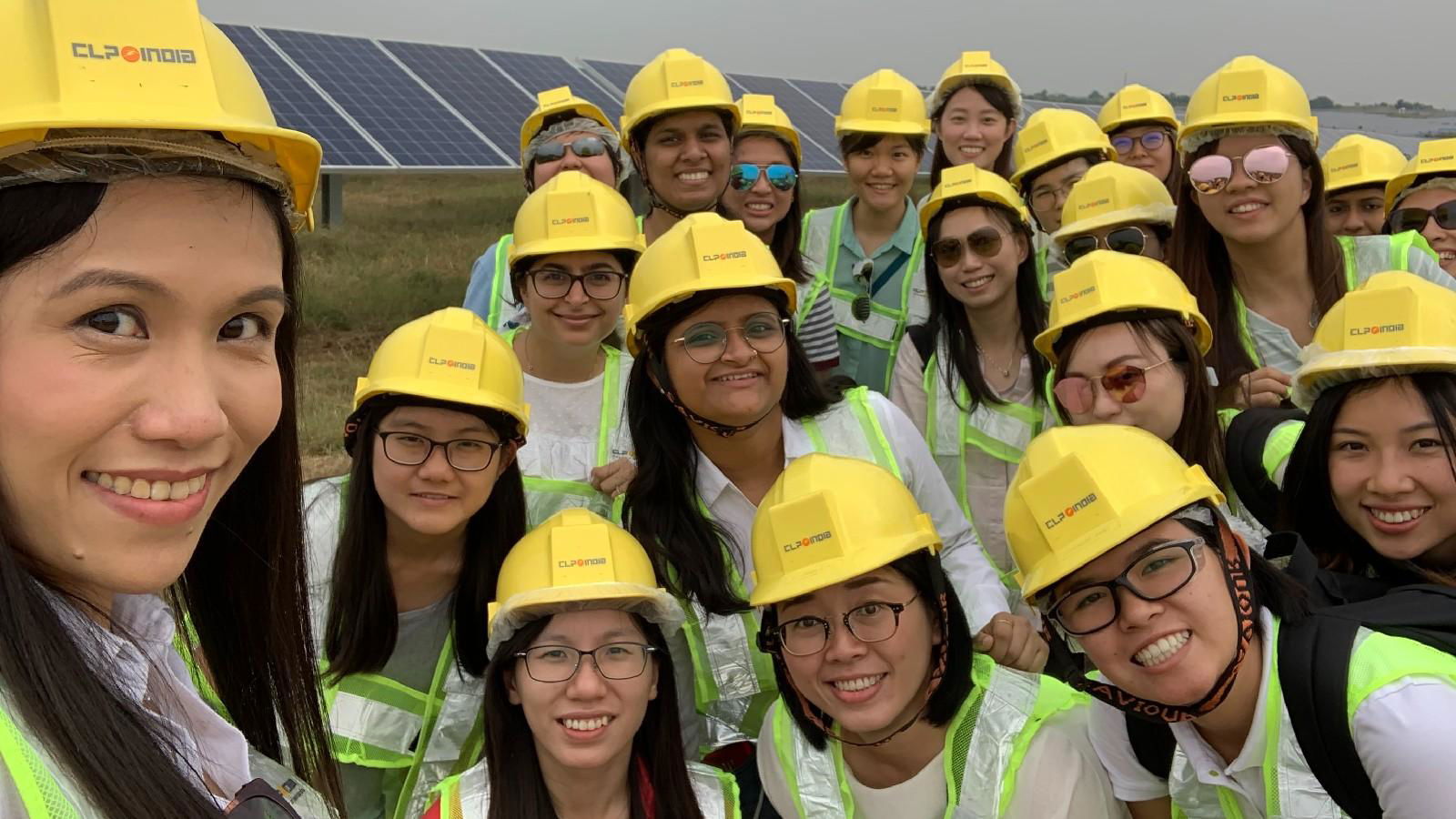
CLP has launched various public education programmes from kindergartens to secondary schools to nurture and attract female students. In the ‘POWER YOU Kindergarten Visitation Programme’, our female graduate trainees and young female engineers visit the kindergartens to introduce the power generation journey, safe use of electricity, and EE&C tips. They also introduce engineering as a profession to the students.
‘Engineer in School’ is a programme where we send young engineers to secondary schools to host seminars on interesting topics such as climate change and energy efficiency. The goal is to arouse students’ interest in science so that more of them will develop a strong foundation in STEM subjects and will be prepared for advanced studies at universities.
At the higher education level, CLP has partnered with the Hong Kong Association of Careers Masters and Guidance Masters to facilitate career teachers’ knowledge about power engineering as a career of choice.
To further demonstrate CLP’s commitment to DEI (diversity, equity, and inclusion) and to foster the culture of having these values in mind in every employees’ daily work, we conducted a ‘Business Practice Review’. This is a mandatory training programme for all staff through live discussion in the training workshops, not only to refresh their understanding of the key principles in our ‘Code of Conduct’, but also to facilitate a better application of these principles in their daily work.
Q: Let’s talk about some challenges you’ve faced now – how easy or how difficult has it been to pivot and change for all these new programmes?
CLP is a great company. Our more than 120 years of success is built on our commitment to society, our solid technical foundation, as well as the way we work as a team in CLP.
With the rapid changes in the environment, it calls for us to be transformed ourselves into the ‘Utility of the Future’ with our decarbonisation, digitalisation, and customer-centricity programmes. Some of these areas are not only new to us, but also to the industry. It thus requires our colleagues to learn and adapt very quickly.
As part of the transformation, we also need to adopt a new way of doing things by rebuilding our culture. Therefore, what is important is preserving our strengths and bringing in new elements to prepare ourselves for the future.
In this journey of change, it is important to bring our colleagues along. We make use of town hall communications, workshops, and internal social media, to explain to our colleagues our vision and approach to drive changes. We also organise learning sessions on key change topics, for example, how to use Power BI or design thinking to facilitate changes.
So far, we have received very positive feedback from colleagues via our pulse check tools. We are looking at enriching our learning curriculum to equip the organisation with future skills as our next milestone in the journey.
Q: It is time to shift the focus to the future – which lies in cleaner fuels and greater energy efficiency. What impact do these game-changing developments have on your workforce – in terms of introducing automation, upskilling the workers, and ensuring harmony between the old and the new way of doing things?
CLP is building a workforce for a future shaped by structural shifts, including energy transition, demographic changes, and evolving regional market priorities. This drives the need for greater organisational agility – the ability to adapt and succeed in a rapidly changing environment.
One of the examples is that more than 4,000 Hong Kong employees have participated in our design thinking training. This programme is intended to nurture a people-centric innovation culture in the company, providing practical problem-solving frameworks for product and service development with users’ needs in mind.
Also, over the last few years, several of our employees have gained professional accreditation in data analytics skills, building their capability to leverage technology and data in new and insightful ways to enhance the customer experience and operation excellence.
CLP’s ‘Executive Development Programme’ for senior managers was held during the year, focusing on developing skills required to lead transformation. The programme combined leadership, energy transition, and business simulation elements, and was conducted virtually in partnership with various international institutes.
We also have a range of staff development programmes for colleagues at different career stages, mentioned previously, to meet future managerial engineering needs.
CLP puts particular emphasis on people development and skills transfer from one generation to the next, thus our CLP Power Learning Institute provides systematic and practical training to uplift the standard of customer services, and capabilities of our staff in the energy retail industry.
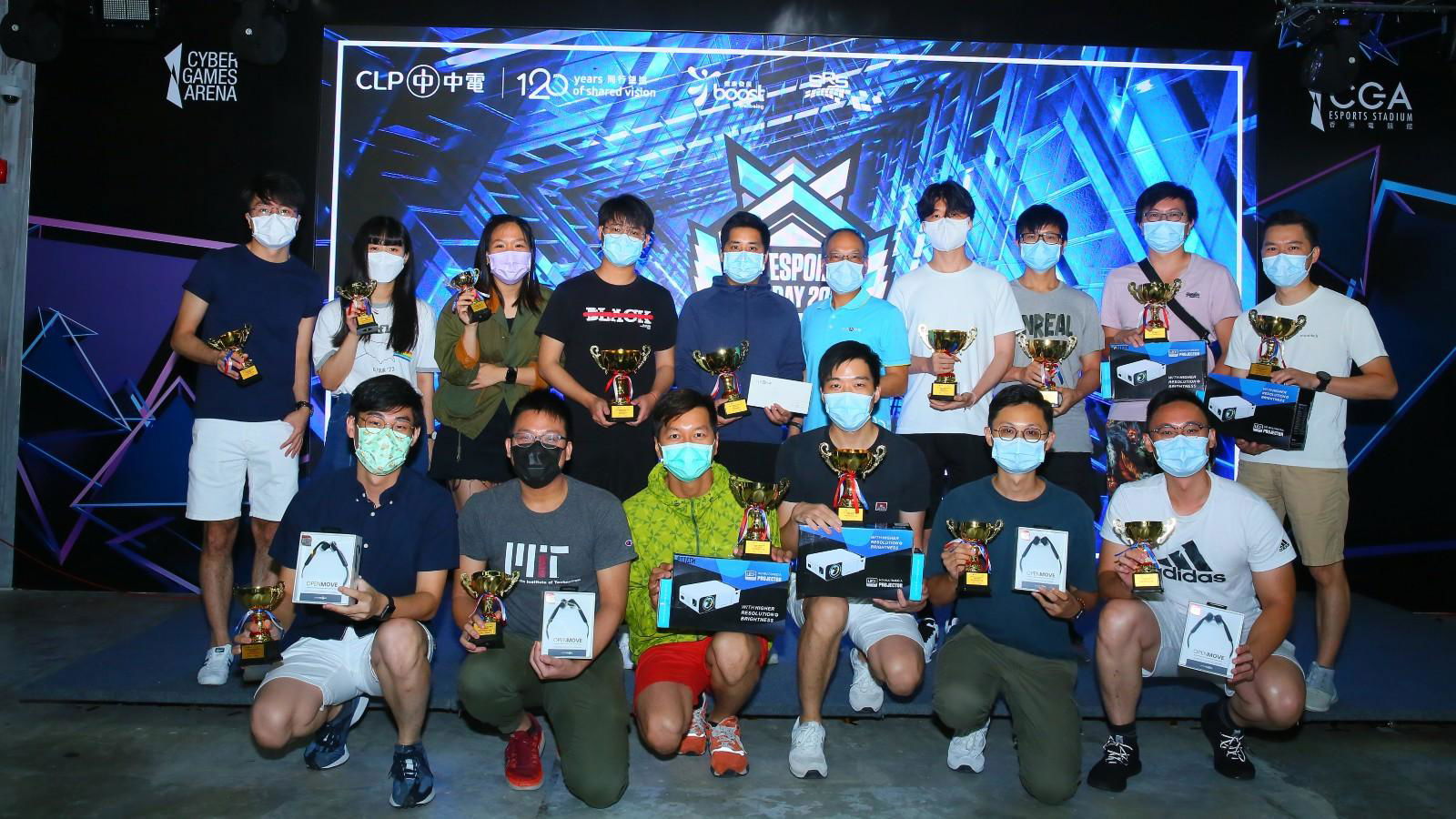
Q: CLP has come a long way since it was founded in 1901. How does the leadership team ensure that legacy does not get in the way of adapting to new trends and innovations? Personally, how do you convince stakeholders of being open to change?
CLP has a deep-rooted ‘Value Framework’, first introduced in 2003, which reflects the time-honoured principles and commitments that have been integral to CLP’s success for 120 years.
This framework includes our long-standing ‘Code of Conduct’ which provides the guiding principles for all company employees to do what is right, behave with integrity and honesty, treat people fairly, respect diversity, obey all laws, accept accountability, communicate openly, and always behave in a way that is beyond reproach.
The company expects all employees to observe and apply these principles in the conduct of the company’s business. We care how results are obtained, not just that they are obtained.
Besides our ‘Value Framework’ and ‘Code of Conduct’, we also have a set of competencies for CLP leaders as a compass to guide our leadership behaviours to reinforce our values while keeping ourselves up to date with the changes in the business and operation environment. As much as we value the wellbeing of our employees, we also look at creating an inclusive environment for everyone to thrive and openly share their ideas. This is our idea of making CLP a safe environment to cradle innovative ideas.
Q: Looking to a post-pandemic road map, what’s on your HR checklist to ensure that CLP’s employee experience remains personalised, purposeful, and timely?
On top of the list is taking care of our colleagues’ individual needs. Besides their wellbeing, we aim to provide a space for them to learn and develop a career with CLP. In CLP’s transformation, there are a lot of opportunities for colleagues to take part in projects that are meaningful for the future and everyone is welcome to be part of it.
Another important vision that we have is to make HR services accessible to our colleagues. We are in the midst of driving digitalisation in HR so that colleagues can access various online platforms. The first area we started is in e-learning – from micro-learning to online learning platform, colleagues can enrich their own knowledge and skills at their own pace anywhere.
Q: What are your personal start/stop/continue goals as you set your resolutions for the year ahead?
I enjoy every moment working in CLP and have learned enormously from the great team around me.
One thing I have benefited a lot from personally in my career so far is creating an environment whereby all are encouraged to give open feedback in a non-hierarchical way. To me, this is essential for being innovative.
We have different transformational initiatives and there are two things I remind myself from time to time. First thing is never stop improving, and always be bold enough to challenge assumptions. What got us here might not be able to get us there; therefore, be open to change.
Another thing I personally see as very important is that we should have fun at work. I wish for both myself and the team in CLP that we work together not because we have to, but because we love to. That’s my motto of life.
This article first appeared in the Q4 edition of Human Resources Online's Hong Kong e-magazine. View the e-magazine here, where you'll find power-packed features and interviews with leaders from Hong Kong, Singapore, Australia, the UK, India, and more!
Image / Provided
share on
Follow us on Telegram and on Instagram @humanresourcesonline for all the latest HR and manpower news from around the region!
Related topics
- Recruitment
- Diversity & inclusion
- Employee engagement
- Corporate training
- Leadership development
- Succession planning
- Upskilling & reskilling
- Digital transformation
- Compensation & benefits
- Health & wellness
- Business transformation
- Leadership
- Talent Management
- L&D
- HR Tech
- Rewards
- Interviews
- Features
- China
- Taiwan


